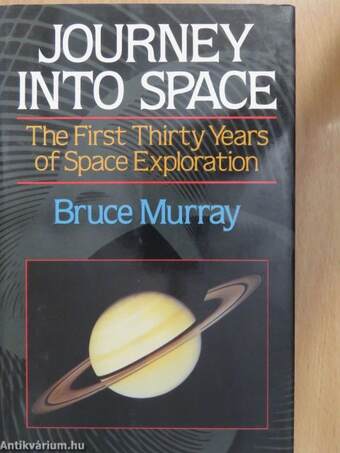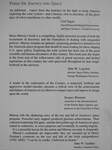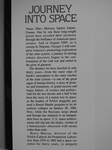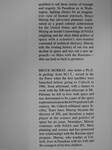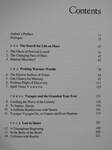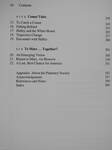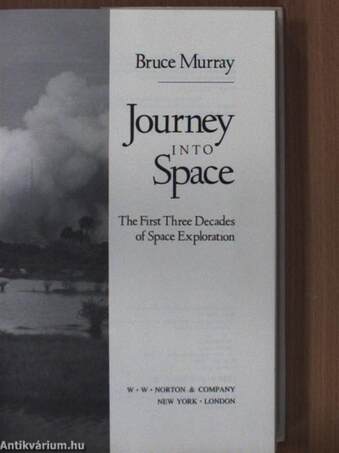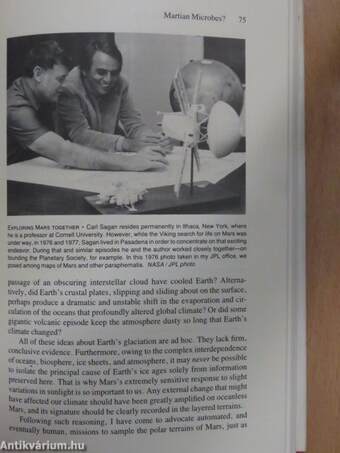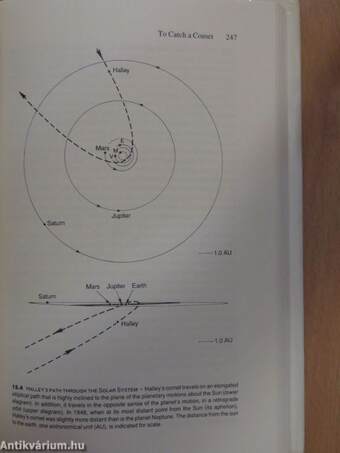1.067.017
kiadvánnyal nyújtjuk Magyarország legnagyobb antikvár könyv-kínálatát

VISSZA
A TETEJÉRE
JAVASLATOKÉszre-
vételek
Journey into Space
The First Three Decades of Space Exploration
| Kiadó: | W. W. Norton & Company |
|---|---|
| Kiadás helye: | New York |
| Kiadás éve: | |
| Kötés típusa: | Félvászon |
| Oldalszám: | 381 oldal |
| Sorozatcím: | |
| Kötetszám: | |
| Nyelv: | Angol |
| Méret: | 24 cm x 16 cm |
| ISBN: | 0-393-02675-2 |
| Megjegyzés: | Fekete-fehér fotókkal, illusztrációkkal. |
naponta értesítjük a beérkező friss
kiadványokról
naponta értesítjük a beérkező friss
kiadványokról
Fülszöveg
Praise for Journey into Space
An informed report from the trenches on the fight to keep America exploring the solar system—and a history, rich in anecdote, of the glory days of robot expeditions to other worlds.
Carl Sagan
Dávid Duncan Professor óf Astronomy and Space Sciences, Cortiell University
Bruce Murray's book is a compelling, highly personal account of both the excitement of discovery and the frustration of dealing with misguided policies. Murray remains an optimist, proposing productive initiatives for the American space program that should be must reading for those shaping U.S. space policy. Exploring the solar system has been one of the great scientific and humán adventures of this century. This book puts the reader in the front seat of the rollercoaster ride of grand successes and dashed aspirations as this country has sent spacecraft throughout its near neigh-borhood in the universe.
John M. Logsdon director, Space Policy Institute, George Washington University... Tovább
Fülszöveg
Praise for Journey into Space
An informed report from the trenches on the fight to keep America exploring the solar system—and a history, rich in anecdote, of the glory days of robot expeditions to other worlds.
Carl Sagan
Dávid Duncan Professor óf Astronomy and Space Sciences, Cortiell University
Bruce Murray's book is a compelling, highly personal account of both the excitement of discovery and the frustration of dealing with misguided policies. Murray remains an optimist, proposing productive initiatives for the American space program that should be must reading for those shaping U.S. space policy. Exploring the solar system has been one of the great scientific and humán adventures of this century. This book puts the reader in the front seat of the rollercoaster ride of grand successes and dashed aspirations as this country has sent spacecraft throughout its near neigh-borhood in the universe.
John M. Logsdon director, Space Policy Institute, George Washington University
A leader in the exploration of the Cosmos, a respected, brilliant and aggressive insider-outsider, presents a critical view of the achievements and failures of America in its efforts to conquer space and impose its image upon the world.
Jacques Blamont
counselor to the director-general of the French Space Agency and professor at the University of Paris
Murray telis the shattering story of the rise and fali of America's space program. Powerful early support produced glorious achievements. Then coherent leadership feli apart, and the first golden age of America in space ended in confusion, in cross-purposes and eventually in searing tragedy.
It is a powerful lesson for the nation and Murray recounts it eloquently.
Murray's credentials are impeccable; they are summed up in Henry Grattan's comment on the rise and fali of the Irish independence (1782-1802): "I sat by its cradle, I followed its hearse."
John W. Gardner founder, Common Cause
JOUHNEY INTO SFACE
Venus, Mars, Mercury, Jupiter, Saturn, Uranus. One by one these long-sought jewels have revealed their mysteries through the brilliance of American space science. And in August 1989, as it sweeps by Neptune, Voyager 2 will com-plete America's pioneering exploration of the solar system, a journey of stirring robotic discovery begun in the con-frontation of the cold war and ended in the glow of glasnost.
The distance we have traveled in only thirty years—from the outer edge of Earth's atmosphere to the outer reaches of the solar system—is one of the great sagas of humán history, a story of prom-ise and frustration, of grand success and tragic failure, of science and politics. And for the last decade and a half it has been the story of a nation lost in space, as the leaders of NASA doggedly pur-sued a flawed Shuttle program to its di-sastrous collapse on January 28, 1986. Now, while the Russians surge ahead and Europe has matured to an indepen-dent force in space, U.S. space achieve-ments still slip into the future, victims of a bureaucratic obsession with means rather than ends.
Bruce Murray, director of the NASA/Caltech Jet Propulsion Labora-tory from 1976 to 1982 and a space sci-entist for thirty years, is uniquely
qualified to teli these stories of triumph and tragedy. In Pasadena as in Washington, fighting always for an imagina-tive view of humán outreach, Bruce Murray has advocated planetary explo-ration- as a grand cultural achievement for the United States and the world. Mixing an insider's knowledge of NASA infighting and the often blind politics of space with a scientist's sure-handed command of technical intricacy, Murray telis the riveting history of our rise and decline in space and lays out a new ap-proach—to Mars with the Russians— that can lead us back to greatness.
BRUCE MURRAY, who holds a Ph.D. in geology from M.I.T., served in the Air Force when the first satellites were launched before going to Caltech in 1960. Soon afterward, with a chance to work with the 200-inch telescope at Mt. Palomar, he feli in love with space and was determined to be a part of the space exploration team at the Jet Propulsion Lab-oratory, the Caltech-affiliated space fa-cility. Years later, Murray became the director of JPL and therefore a major player in the science and politics of space for six years. Nowadays, Murray continues with NASA and JPL Mars planning and science and has pioneered new relationships with the Russian space program. Murray, who teaches at Caltech, lives in Pasadena with his wife and the youngest of his five children. Vissza
Témakörök
- Idegennyelv > Idegennyelvű könyvek > Angol > Műszaki
- Idegennyelv > Idegennyelvű könyvek > Angol > Természettudományok > Csillagászat
- Természettudomány > Csillagászat > Idegennyelvű
- Természettudomány > Csillagászat > Űrhajózás, űrkutatás
- Műszaki > Idegennyelv > Angol
- Műszaki > Közlekedés > Repülés > Egyéb
- Műszaki > Közlekedés > Repülés > Repüléstörténet
- Műszaki
Bruce Murray
Bruce Murray műveinek az Antikvarium.hu-n kapható vagy előjegyezhető listáját itt tekintheti meg: Bruce Murray könyvek, művekMegvásárolható példányok
Nincs megvásárolható példány
A könyv összes megrendelhető példánya elfogyott. Ha kívánja, előjegyezheti a könyvet, és amint a könyv egy újabb példánya elérhető lesz, értesítjük.



